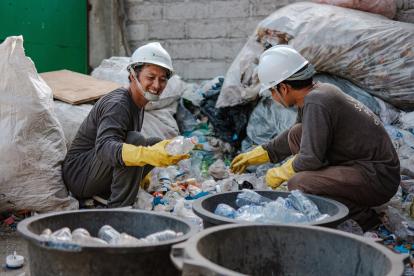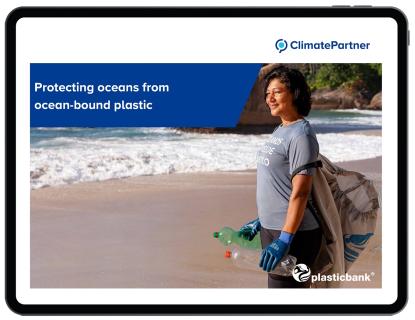Protecting oceans from plastic pollution

The ocean is our planet's greatest carbon sink, absorbing 25% of carbon emissions.
Tackling ocean-bound plastic while empowering local communities
Every minute, the equivalent of one garbage truck of plastic enters the ocean. It is a serious issue requiring urgent action. The Plastic Bank project aims to catch plastic waste before it reaches the ocean by supporting local communities to collect plastic in exchange for additional income and life-changing benefits. As a result, the project has a positive impact on society as well as the environment.
How does it work exactly? Plastic collection points are established in coastal areas particularly affected by plastic pollution and poverty. At the same time, the project empowers local people, often living in poverty, to become members and collect plastic before it can enter the ocean. At the collection branches, members can exchange the collected plastic for money or benefits such as health, work, or life insurance, grocery vouchers, or school supplies. The collected plastic is cleaned, sorted, and recycled into Social Plastic® – feedstock that is reprocessed and reintegrated into products and packaging, creating a circular economy.
Currently, the project is active in six countries: Brazil, Egypt, Indonesia, and the Philippines, with license-based expansion in Cameroon and Thailand.
The Plastic Bank project represents an additional commitment to climate action and does not produce verified emission reductions. This is why we combine your financial contribution to this project with a certified climate project.

Why is it important to protect oceans?
Oceans have a significant influence on the climate, absorbing 25% of all carbon emissions and capturing 90% of the excess heat generated by these emissions. Oceans also produce around 50% of Earth‘s oxygen and help regulate global temperatures by transporting heat from the equator to the poles.
However, due to human activity, our oceans face severe threats. Climate change is causing harm to coral reefs, overfishing is depleting fish stocks, and agricultural nutrient pollution is contributing to the formation of dead zones. In addition, more than 12 million tonnes of plastic finds its way into the ocean annually, often transported there by rivers. Once in the ocean, plastic endangers marine ecosystems. It is estimated that one million seabirds and 100,000 marine mammals are killed every year due to ingesting or becoming entangled in ocean plastic.
Plastic pollution is of particular concern in developing countries where waste disposal infrastructure is lacking or inadequate. This is where this project comes in.
Contribution to the United Nations‘ Sustainable Development Goals (SDGs)
More information about the Plastic Bank project
[unsichtbarer anchor]
Our impact report provides you with even more information on our project for plastic free oceans. Learn about the positive effects of the project and get to know the people who benefit from it.





